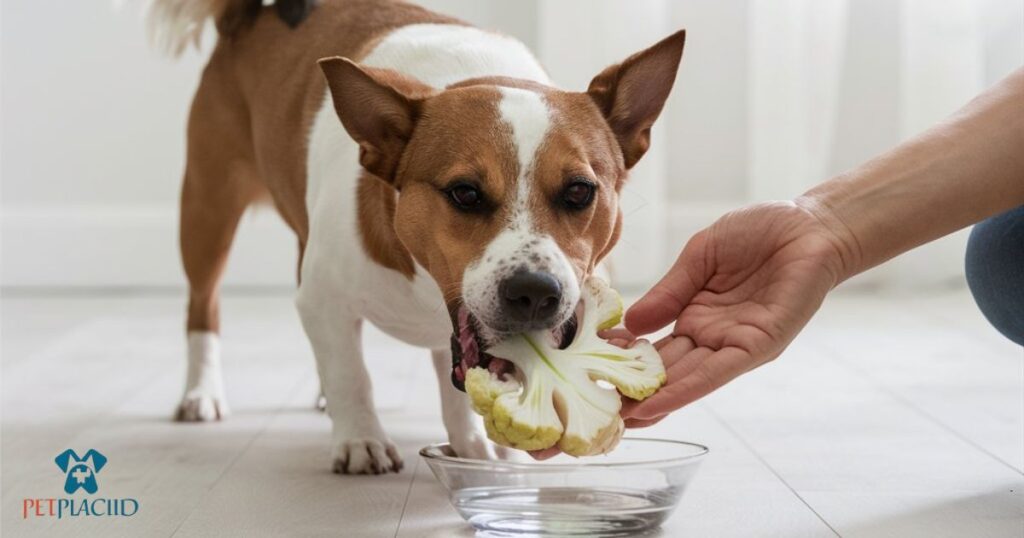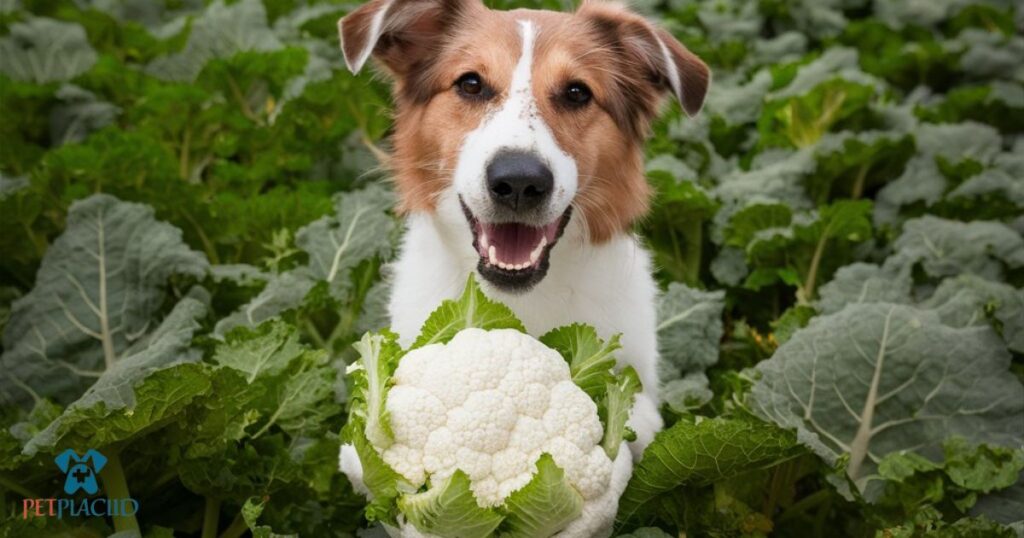Cauliflower, a vegetable packed with nutrients, poses both benefits and risks for dogs. While dogs eat cauliflower, it can offer vitamins and fiber beneficial for their health. However, moderation is key, as excessive consumption may lead to digestive upset or gas in some dogs. It’s essential to monitor your dog’s reaction to cauliflower and consult with a veterinarian for guidance on incorporating it into their diet.
Curious if dogs can munch on cauliflower Discover the scoop on whether Dogs Eat Cauliflower. Uncover the Benefits and Risks, ensuring your furry friend stays healthy. Learn how to keep your pup safe while enjoying this crunchy veggie treat.
Dogs eat cauliflower can be a nutritious addition to their diet. Cauliflower provides vitamins and fiber, promoting good digestion and overall health. However, too much cauliflower might cause digestive upset, so it’s best to offer it in moderation.
Learn From the Best
Learn From the Best explores how dogs eat cauliflower. Discovering from experienced instructors, dog owners can grasp the nuances of canine nutrition. Understanding how dogs eat cauliflower can lead to healthier feeding habits.
By observing how dogs eat cauliflower, owners gain valuable insights. Learning from seasoned instructors ensures responsible pet care practices. These lessons empower owners to make informed decisions regarding their dog’s diet.
In the journey of understanding how dogs eat cauliflower, learning from experts is crucial. With proper guidance, owners can provide balanced diets, promoting their furry friend’s well-being.
Meet One of Your New Instructors
Meet one of your new instructors, eager to guide you on whether dogs eat cauliflower. They’re here to share insights, making sure your furry friend stays healthy. Learn how cauliflower can be a part of your dog’s diet safely.
Realize the benefits and risks, understanding if dogs eat cauliflower without harm. Your instructor will break down the dos and don’ts, ensuring your pup’s well-being. With their expertise, you’ll navigate the world of canine nutrition confidently.
Can Dogs Eat Cauliflower?
- Dogs can eat cauliflower, but in moderation.
- It’s safe for them, but too much can cause digestive upset.
- Cauliflower is a nutritious treat for dogs, providing vitamins and fiber.
- However, always remove the stem and leaves before feeding.
- When introducing cauliflower to your dog’s diet, start with small amounts to see how they react.
- Remember, moderation is key for a happy, healthy pup!
How Much Cauliflower Can Dogs Eat?
When it comes to dogs eating cauliflower, moderation is key. Too much cauliflower can lead to digestive upset in dogs. It’s best to start with small servings and observe your dog’s reaction closely. As a general guideline, limit cauliflower intake to a few small florets per serving, ensuring it’s a part of a balanced diet for your furry friend.
How to Safely Feed Cauliflower to Your Dog
When dogs eat cauliflower, it’s important to ensure safety. Serve plain, unseasoned cauliflower to your dog. Cut it into small, bite-sized pieces for easy digestion.

Whether raw or cooked, cauliflower can be a healthy treat. Avoid feeding the cauliflower stalk to your dog. Stick to small servings to prevent digestive issues.
Remember, dogs can eat cauliflower safely when served in moderation. Explore other healthy veggies your dog might enjoy.
Other Vegetables Dogs Can Eat
Dogs eat cauliflower, but they can also enjoy a variety of other veggies. Carrots, rich in vitamin A, promote healthy eyesight and chewing helps clean teeth. Green beans are another favorite, providing fiber and low-calorie content for weight management.
Spinach is packed with iron and vitamins, aiding in blood circulation and overall health. However, moderation is key due to its oxalic acid content. Sweet potatoes offer a sweet treat packed with beta-carotene, supporting immune function and skin health.
Broccoli, similar to cauliflower, is safe for dogs and offers a range of nutrients. Its crunchy texture provides dental benefits while vitamins promote vitality. Remember to introduce new vegetables gradually and watch for any adverse reactions in your furry friend.
2. Can Dogs Eat Cauliflower? Health Benefits and Cautions
Dogs can eat cauliflower, but caution is key. Too much can lead to digestive upset. It’s essential to feed it in moderation.
Cauliflower offers health benefits for dogs. It’s low in calories and high in fiber, aiding digestion. However, some dogs may struggle to digest it properly.
Remember, dogs eat cauliflower, but it’s not a primary food source. Always consult your vet before introducing new foods.
Health benefits of cauliflower
Dogs can benefit from cauliflower’s nutrients. It’s packed with vitamins and minerals. This can support their overall health.
Cauliflower promotes digestion in dogs. Its fiber content aids in digestion. This helps prevent digestive issues.
Including cauliflower in your dog’s diet supports their immune system. Its antioxidants boost immunity. This keeps your furry friend healthy.
Cautions about cauliflower
- When Dogs Eat Cauliflower, it’s essential to be cautious.
- Some dogs may experience digestive upset from cauliflower.
- Introduce it slowly and watch for any adverse reactions.
- Always monitor your dog closely when introducing new foods like cauliflower.
- Some dogs may have allergies or sensitivities to certain vegetables.
- Consult your veterinarian if you’re unsure about feeding cauliflower to your dog.
Snack time!
During snack time, dogs can enjoy cauliflower as a tasty treat. Dogs eat cauliflower as a healthy snack option. Remember to offer cauliflower in small, bite-sized pieces for easy consumption.
Ensure that cauliflower is plain and unseasoned for your dog’s safety. Dogs eat cauliflower both raw and cooked, providing versatility in snack options. Monitor your dog’s intake and stick to appropriate serving sizes.
How to Prepare Cauliflower for Dogs to Eat Safely
To ensure dogs eat cauliflower safely, start by rinsing it thoroughly to remove any dirt or pesticides. Next, chop the cauliflower into small, bite-sized pieces, avoiding the tough stalk. Finally, either steam or boil the cauliflower until it’s soft and easy for your dog to chew and digest. By following these steps, you can prepare cauliflower for your furry friend to enjoy without any worries about safety.
Recommended This Blog; 30 Cutest Dog Breeds
Other Healthy Vegetables for Dogs
For dogs, a variety of vegetables can be healthy. Alongside cauliflower, consider carrots, green beans, and sweet potatoes. These veggies offer essential nutrients and can be a tasty addition to your dog’s diet. Remember to introduce new foods gradually and monitor your dog for any adverse reactions.
Frequently Asked Questions
Is cauliflower good or bad for dogs?
Cauliflower can be a healthy treat for your furry friend when given in moderation.
Can I feed my dog with cauliflower?
you can! Cauliflower is safe for dogs to eat, but ensure it’s served plain and in small, manageable pieces to prevent choking hazards.
Are cauliflower leaves poisonous to dogs?
While cauliflower leaves aren’t inherently toxic to dogs, it’s best to avoid feeding them to your pet. Stick to the florets for a safer option.
Why does my dog love cauliflower?
Dogs may enjoy cauliflower due to its crunchy texture and mild flavor. Plus, it’s packed with nutrients, making it a tasty and nutritious snack option for your canine companion.
Conclusion
Cauliflower can be a healthy and enjoyable addition to your dog’s diet when served appropriately. While it offers various nutrients and is generally safe for dogs to consume, moderation is key. Remember to feed cauliflower in plain, unseasoned form and in small, bite-sized pieces to prevent any potential choking hazards. Additionally, it’s essential to monitor your dog for any adverse reactions when introducing new foods.
Alongside cauliflower, there are many other healthy vegetable options for dogs, such as carrots, green beans, and sweet potatoes, which can provide additional nutritional benefits and variety to your pet’s meals. By offering a balanced diet that includes a variety of vegetables, you can contribute to your dog’s overall health and well-being.

Jackson is a seasoned professional in the field of pets, boasting four years of enriching experience. His expertise spans pet care, training, and health, ensuring insightful and reliable content for pet enthusiasts on our site.







